That would be a perfect Norco Storm. Assembling it to that state was the exercise. It was the final assignment of the final day of Winterborne Bike Institute's (WBI) two week Pro Mechanic's Course. From box to showroom, the Storm's transformation was worth 40% of the final grade.
"Which way do I loosen this?"
Mike D., whose identity is deliberately vague to protect the guilty, was my partner in crime; he was ready to wage war on the unsuspecting Norco's bottom bracket (BB).
Norco is a Canadian brand which in this case means we grew the trees sacrificed to make the Storm's box. The bike is really Asian so -- of course?! -- it has English bottom bracket cups. Italians have their own size; their cups are spaced slightly more generously than those of the Anglos, unless, that is, the operation is off-shored, then they can conform to English sizing as well. The French, just because they're French, have a right cup that's supposedly backward because it goes on to the right, as do the Italians, which is opposite the "right" way of the English whose right cup goes on to the left. Got it?
It all makes me wonder how the hell the manufacture of bras ever managed to go global; at least there everyone agrees on cup sizes and how the damn things should go on. Perhaps if I hadn't been in my cups with Bill at McCabes Pub instead of studying them in Barnett's Bicycle Repair Manual it would all make more sense.
"Mike, it's English, the left side comes off to the right."
"No, it comes off to the left. Did you mean your left or my left?"
"You're right, I meant my left."
"Right."
Winterborne Bicycle Institute (WBI) has no equivalent in Canada. Tucked away in a nondescript industrial park on the southern fringe of Guelph, it seeks to fill a void by emulating its American counterparts , United Bicycle Institute (UBI) and Barnett Bicycle Institute (BBI), enterprises dedicated to providing a comprehensive, methodical approach to learning bicycle mechanics and imbuing the undertaking with professional standards.
Indeed, the title of "Bicycle Mechanic" barely registers, if at all, as a legitimate profession in the wider job market, even though modern bicycles incorporate hydraulics, carbon/composite construction, transmissions -- ever seen the inside of Nexus hub? -- and an ever increasing array of proprietary technologies and standards.
Flick that doodad, some thing-a-ma-jig clicks and voila! it's easier to pedal. Most cyclists know as much about their machines as the typical bike wrench gets paid: next to nothing. Perhaps a little learning' prior to reaching for the wrench might be a good thing.
So why not enrol at WBI during vacation? It made sense at the time but while catching' some fresh air and sun between labs I wasn't so sure. I could have been sipping sangrias in the Caribbean, instead I was lounging in what dismally resembled the parking lot of a Scarborough industrial park. All that was missing was a couple of shootings to make me feel like I'd never left home.
With the BB removed, Mike and I proceeded with a compulsory assessment of the Storm's BB shell. Good luck finding an assembler in the real world who would lavish such attention on product of the Storm's caliber.
Damn, just as we anticipated. Alan Medcalf , our instructor, deemed the shell needing facing. That would eat into the time allotted for the assembly; now time penalties would likely cost us marks.
Build it and they will come
WBI is the baby of Alan (right in photo) and custom frame builder Jay Filer (Winterborne Custom Bicycles operates out of the same space), alumni of BBI and UBI respectively.
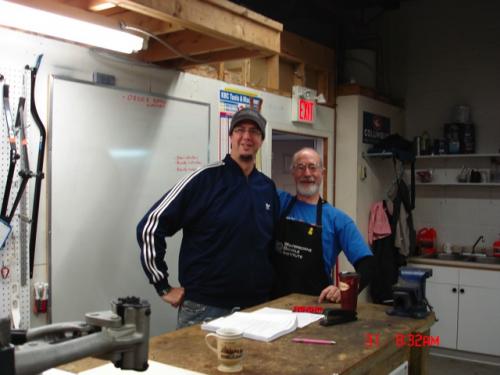 The Faculty: Definitely not Oxford!
The Faculty: Definitely not Oxford!
I marvelled at their patience. To my thinking (always suspect) there were more than a few instances where cognitively challenged students merited having their noggins placed in the bench vise, where copious cranking could more effectively embed the curriculum into their craniums. (Presumably, you'd crank in the opposite direction if the vise was Italian). That Alan and Jay conducted themselves with equanimity throughout attests to their forbearance, an essential trait of any good teacher.
They were complementary: Alan was more punctilious, more effective at communicating: he kept the show on schedule; Jay was more digressive (educational in its own right), affable, and well...prone to toolgasms. Confronted with a rounded nipple he succumbed to raptures: "Time to clamp on my new adjustable spoke wrench!" Which sounds more like a drill from the Marquis de Sade School of S&M than what it was: a consequence of novices building wheels.
"More crooked than a politician!"
As per the assembly checklist, Mike assessed the alignment of the Norco's rear derailleur hanger. He wasn't kidding: the vectors of the frame and the rear derailleur would have them in different time zones when the bike was wheeled out of the shop.
"Let's cover our asses." was my professional response. "The hanger is aluminum, it could snap right off. Let's get Alan to straighten it."
"Good call."
Teacher thou art thy pupils' student.
A wealth of diverse experience resides in WBI's students and Alan and Jay were wise enough to know they didn't know it all. They'd cede the floor and let the bright lights shine to the illumination of all. These impromptu sessions often made the most vivid impressions.
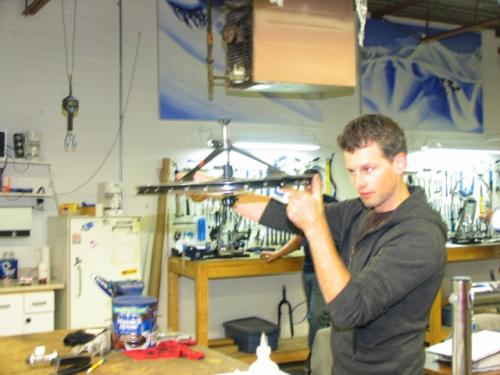 Life's a circle: Mind your dish, be true.
Life's a circle: Mind your dish, be true.
Paul elaborated on the equipment and intricacies of bike fits; Harry spoke to the myriad ways a retail space's layout liberates dollars from wallets; WBI alumnus Bruce popped in with a frame he TIG welded while at UBI's frame building course in Ashland, Oregon.
Rick's after hours slide show on his Tour d'Afrique resonated deeply. It reaffirmed the bicycle as more than metal, plastic and rubber (a common reduction by us budding mechanics), presenting it in the guise that passionate velophiles readily recognize: a simple, accessible catalyst for (self) discovery and revelation.
Mike and I congratulated ourselves on our deft appeal to Alan's expertise and, now that the rear derailleur and frame were on the same longitude, we moved on to adjusting the indexing. With the Norco hoisted in the repair stand we spun the crank up to speed, running through the gears like maniacs.
"Looking good!" we grinned moronically. But our delusions of competence dissolved with a hideous crunch.
"Sh_t!" The chain had run off the small cog and jammed -- but good! -- between the dropout and cassette. It was an underwhelming performance: we hadn't thought to recheck the limit settings on the rear derailleur following realignment of the hanger. Amateur hour.
On the opposite end of the spectrum to Rick's presentation was Shimano tech guru and all round nice guy Ben Pye's stopover. The wise man brought the goods: A 2009 Dura-Ace (DA) Electronic gruppo mounted on a Cervelo TT bike (travelling incognito).
HAL: Just what do you think you're doing, Dave?
Dave: Trying to shift?
The glimpse into the future gave cause to both wonder and wince. The DA electronica is the Velosphere's equivalent of Formula One technology. There are no shift cables -- ditch those barrel adjusters! -- the derailleurs have built in motors controlled by the onboard offspring of HAL 9000. Trimming and shifting is no longer a function of cable pull and tension; it's a result of electrical impulses and programming algorithms. The setup was impressive: try as we might, two of us (one manning each shifter) couldn't derail, er, stymie the system. It performed flawlessly.
Conceivably, once the mechanics of shifting -- can braking be far behind? -- have been liberated from muscular inputs, a direct neural-mechanical interface is possible: slap on a few electrodes -- no, not there! -- and the next gear would require little more than a thought. Just don't have second thoughts or be of two minds on the topic.
What's the cost of making that Dura Ace exotica your own? A good guess is an arm and leg (No worries, technological imperatives will soon render those appendages superfluous to cycling as well.) Or maybe as much as it takes to keep the bellies in one of those African villages Rick toured through free from hunger pains for a year. Or the abandonment of the notion that the beauty of bicycles abides in simplicity. More to the point, the gruppo's stratospheric price tag qualifies as disposable income to its rarified target market.
"Sausage fingers!"
I fumbled with a stack of spacers from the Storm's hydraulic brake caliper mounts before dropping them all, cursing as they rolled helter skelter under the work bench. Once the wayward pieces were corralled and reassembled, centering the caliper to the rotor was short, easy work.
There was no point rushing now; we had already incurred a time penalty on the assembly; we settled back, taking time to fuss over details and cosmetics.
Mike scanned the checklist. "Let's lube the cables."
"OK, who has Judy's Butter?"
"Judy Juice over here!" Terry called from across the shop.
Benches with no Wenches
What would prompt Terry, a mild mannered furniture maker from Guelph, to morph into a prolific purveyor of risqué double entendres? The aforementioned Judy Butter for one. And crank pullers, greased spindles (ISIS and Octalink but not square taper), and loose balls, as in loose ball bearing BBs and hubs. Don't even mention tube reaming.
Yes, men will be boys (guilty) and our cohort, suffering from an absolute feminine deficit, habitually revelled in ribaldry. A few of the fairer sex have left their mark as they passed through WBI, most notably on the wall of the institute's crapper where students observe tradition by subjecting their captive audience to velocentric wisdom. There one of our very own Wenches with Wrenches, further armed with a sharpie, honored custom with splendid artistry. If this Harpy with a Sharpie is as talented a Wench with a Wrench she is certainly fit to Prep the Pinarello!
Drop your tools and step away from the bikes: "That's it, times up!" bellowed Jay.
The exam -- the week, and the course -- was over. A wave of relief washed over me; I hadn't realized how intense were the past two weeks; it felt good to have it all done with.
All that remained was the grading. Cable housing loops, fastener torques, handlebar angles, wheel true...everything would be inspected. I was satisfied: we did a good job. It wasn't a perfect Storm, it wasn't even a great one, but it was pretty good: a true reflection of our abilities. The Norco was fit to ride off the showroom floor as it was.
I shook Mike's hand. "It was a pleasure working with ya, Mike." And it had been.
"Pleasure too, Luke."
A little knowledge is a dangerous thing...
So whadda ya get at the end of it all? Well, there's the satisfaction of a spiffy certificate and an honest effort. Then there's the friendships, contacts and memories you made as well as the little you possibly learned about yourself and the little more you certainly learned about bikes and the biz.
Are you qualified to walk into a local bike shop and show the head wrench how it's all done? Don't even think about it. You're only equipped with the knowledge of the skills and procedures required for competence, it's only through their application that experience can develop them, and you can actually attain proficiency.
You just spent two weeks in a shop; imagine spending two, ten, or twenty years there, then understand just how adept an experienced mechanic can be.
All the shop and tools were now idle. The class, working in pairs, had just devoted three hours to assembling bikes costing anywhere from $750 to upwards of $1500 (guesstimating). Compared with "real" wrenches, our productivity was dismal -- two guys spending three hours on one bike would qualify us for the exit in the working world.
The bikes were destined for the shops that lent them for this purpose. They were product, bought and paid for, headed for the showroom floor where they figured into the convoluted calculus of inventory, overhead and profit. There the bike would await the scrutinizing eye that deemed it, and implicitly our contribution to it, a good buy.
So ending the process that began in Asian foundries and factories half a world away.
Alumnus Musings
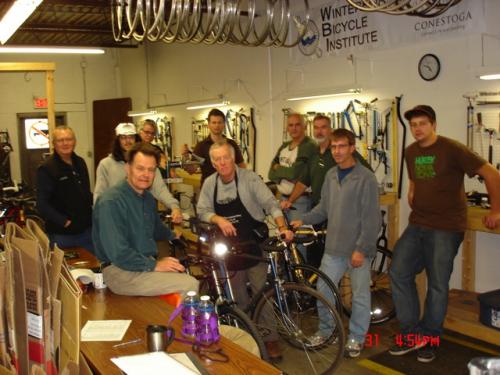 Class of 10/08: Go forth and wrench
Class of 10/08: Go forth and wrench
Is it worth it? The course ain't cheap: tuition is just shy of $1500. If you require accommodation in Guelph for the duration figure in another $500 for that and food.
Education costs money. So does ignorance. The real issue here is not the cost of the course but whether you derive satisfactory value from it, and there it gets tricky because the concept of value is notional.
As a simple transaction, the return on investment renders the proposition difficult to justify: two grand buys a lotta Kraft Dinner, you're sacrificing a lifetime's supply of vitamin K in a pursuit that's generally accorded the same prestige and pay as dispensing donuts at Tim Hortons. You must be a few double-butted spokes short of a three-cross wheel to think this vocational trajectory will land you on the Fortune 500 list. Repeat the last line five more times.
If a passion is steering you toward WBI, or personal/professional betterment, or a yearning to travel -- preferably by bike -- down your own path, then you're going in the right direction. Congratulations, yours is a course of more enduring rewards.
Candidates would benefit immensely by an honest assessment of their mechanical aptitude, ability to learn -- a skill in it's own right -- and their technical experience and knowledge (where it concerns bicycles). Suffice to say if you're the type that relies on the local shop to fix your flats, drop by CBN, Bike Pirates, enrol in one of WBI's weekend courses or avail yourself of one of the numerous online resources first. Get your feet wet before taking the plunge.
There is no vetting of students: you pay your money and you're in. (WBI could be more discerning.) That doesn't mean you should be there though and clearly some in our class shouldn't have been, overwhelmed as they were by the pace of course and the amount of homework.
Did I mention the homework? Steel yourself for supersized servings of dry, technical reading that commonly leave you feeling like your skull has been peeled back and cerebrum rubbed raw with 80 grit sandpaper. The salient lesson of all the cramming was that bicycles, as products and an industry, increasingly rely on complex, diverse technologies.
Accordingly, outfits like WBI are important. They define and transmit essential knowledge and skills in a systematic, accessible manner; establish a base level of competence; and legitimize a vocation by conferring professionalism and a measure of accreditation -- all factors that grow cycling, as an industry and lifestyle, and raise its mechanics above the rank of glorified McMenials.
Later the WBI Alumni Association convenes over a few wobbly pops. Terry (with wife Catherine), Bill and myself survey the scene from the patio of the Woolwich Arms. Hello, what's this? A colorful procession of a dozen cyclists is rolling down Woolwich street.
Of course, it's the last Friday of October -- and Halloween! This must be Guelph's Critical Mass. An exuberant two-wheeled expression of self-affirmation: how fitting an end to the past two weeks. It's also the final lesson -- one you'll never find in any curriculum.
Every keen mechanic apprehends this though it cannot be taught: cranks, chains and bearings; torques, tensions and specs.; wires, tubes and hoops: they all can literally be poetry in motion.
But that's something you must learn for yourself.

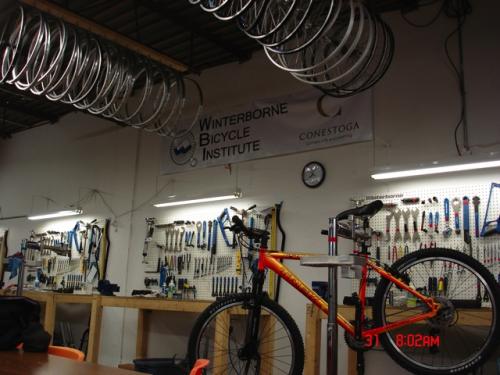
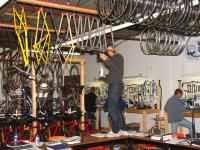
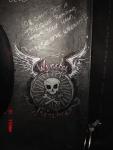
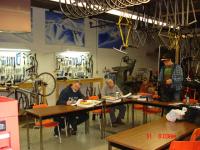
Comments
vic
Learning about bikes
Mon, 11/10/2008 - 11:09I'd like to take a course like this someday, if I could ever find two weeks of time to do it. Add that to my list of desired courses in photography, various computer stuff, etc. though!
I'm not too shabby at doing the basics on my own bikes. Lots of learning from trial-and-error, the late great Sheldon Brown, reading on the web, learning from friends, and of course time spent at the Re-Cycles bike co-op in Ottawa working on my own bike and fixing up others. Nothing beats hands-on experience, especially with some help.
I should make more of a point of checking out some of CBN's workshops and maybe spending some time at Bike Pirates too.
It can feel quite empowering to be able to fix your own bike. Even cooler when you fix someone else's. :)
JayFiler (not verified)
Thanks Luke
Mon, 11/10/2008 - 18:17Wonderful Blog Luke. I'm astounded how you managed to capture your time at WBI and eloquently manage to express it here in your blog. Thank you for attending , and thank you for your honest, no bullshit reflection on your experience here. Don't be a stranger, and come back to Guelph soon so we can get out for a ride together.
Cheers,
Jay
Winterborne Bicycle Institute